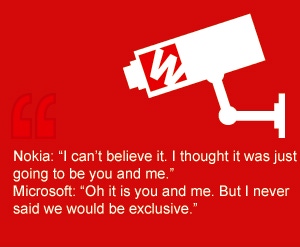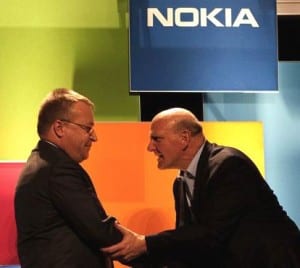It’s that time of year again readers: Back to school. New shoes; new backpack; new Windows Phone 8 device? Yep, they’re finally here - – those first Windows Phone 8 handsets, launched in that awkward window between the end of August and the annual Apple product frenzy that takes place in early September. As if Windows Phone champion Nokia didn’t already have enough to worry about, handset king Samsung delivered the Finn a ringing slap across the face by announcing its own WP8 unit six days earlier.
September 7, 2012

By The Informer
It’s that time of year again readers: Back to school. New shoes; new backpack; new Windows Phone 8 device?
Yep, they’re finally here – those first Windows Phone 8 handsets, launched in that awkward window between the end of August and the annual Apple product frenzy that takes place in early September. As if Windows Phone champion Nokia didn’t already have enough to worry about, handset king Samsung delivered the Finn a ringing slap across the face by announcing its own WP8 unit six days earlier.
Nokia and Microsoft announced a “broad strategic partnership” to build the Windows Phone ecosystem in February last year and the Informer can only imagine the scene that took place on the last day of August – it was probably a bit like the wooden interaction between constipated vampire film star Robert Pattinson and on-screen-off-screen beau Kristen Stewart when details of her straying hit the headlines.
A sullen Nokia sits nursing a stiff glass of Koskenkorva at the bar, looking up with teary eyes as Microsoft enters in a glittering dress and cloud of perfume.
Nokia: “It’s all over the news! I can’t believe it. I thought it was just going to be you and me.”
Microsoft: “Oh it is you and me. But I never said we would be exclusive. Don’t be so upset.”
Nokia: “Well, you know Samsung will keep running back to Android. You know I won’t. I need you…”
Of course, like any good soap opera, this story has many layers, and Samsung is still very much smitten by Android. And given the Korean firm’s track record of commitment to the US operating system, there certainly won’t be any exclusivity between Samsung and Microsoft. It’s such a, er, promiscuous industry, isn’t it?

elopballmer
Does Microsoft Have Nokia By The Short And Curlies?
Still, the launch is an especially big deal for Microsoft, as the firm is aiming to generate awareness and demand for Windows Phone 8 devices among not only consumers and carriers, but also business users. Windows Phone 8 shares common code with the Windows 8 OS, which is expected to be used widely among businesses desktops and laptops when it launches next month.
Interestingly, Tony Cripps, principal analyst for devices & platforms at Ovum, said that the Windows Phone platform is not yet performing to the research firm’s expectations. Something that he suspects could also be a deliberate move by Microsoft, as the firm seeks to avoid flooding the market prematurely with the platform before it is in a position to play up its synergies with Windows 8 and its business applications.
By then, of course, Apple will have unveiled the iPhone 5 and the tech world will have given itself a collective hernia in the hysterical fan frenzy that is sure to follow.
Nokia did make a significant boo- boo at the launch of the flagship Lumia 920, when a sharp -eyed journalist spotted the reflection of a cameraman in the TV advertisement meant to be showing off the handset’s camera capabilities. As two cyclists cruise along the dockside, the guy is filming his girlfriend on his 920 to show how sweet the device’s technology is. Except it was filmed on a proper video camera. Shocking! The Informer is outraged at the irresponsibility here. As a keen cyclist, he knows you should never distract yourself with phones, cameras or similar when riding.
The UK has gone cycling crazy of late, caught up in the slipstream of ‘medalmania’ brought on by the Olympics and Paralympics over August and September, with some cracking examples of teamwork from Team GB.
The UK’s operator community displayed a similar ability to work together after the mobile commerce joint venture between O2, Vodafone and Everything Everywhere (parent of the Orange and T-Mobile brands in the UK) was granted unconditional approval by the European Commission.
Project Oscar was approved by the authority, despite 3UK being left out of the venture. The EC ruled that Oscar is not likely to be a significant impediment to effective competition and 3UK said it does not expect to suffer from being excluded as one of the founding members.
Making all the right noises about the spirit of openness, the operators added that they are committed to ensuring that the JV services are open to all, including all operators and MVNOs, third party publishers, banks, advertising agencies, retailers and any company that wants to engage in this space.
It seems everyone’s got a bit on the side however, and Everything Everywhere is no different. The company recently signed an exclusive, five-year partnership with payment processor MasterCard to develop mobile and digital payment products and services for the operator’s 27 million-strong subscriber base, by combining their financial and technological assets.
The two firms have a history of working together. Last year, they launched Orange’s NFC service QuickTap, and the Orange Cash pre-paid card. This latest move is along similar lines, with a co-branded pre-paid solution for mobile devices that allows customers to make payments using NFC.
MasterCard has turned out to be the saving grace of Swedish mobile payment firm iZettle too, after it was forced to stop processing Visa card transactions in three European markets; Denmark, Finland and Norway.
Visa Europe said that the iZettle service does not meet its policy requirements in these markets but you have to wonder whether other wheels are in motion. The Swedish firm provides apps and hardware that enable iOS and Android devices to function as payment card readers, similar to the Square model created by Twitter founder Jack Dorsey. Square, which provides its similar solution in the US, has benefitted from investment from Visa, while iZettle has investment from MasterCard.
There was a similar game of friends and enemies going on among the UK operators this summer too. Playing nicely in the mobile money space on one hand, the other was forming into an angry fist as Vodafone lambasted UK regulator Ofcom for its decision to allow Everything Everywhere to launch LTE services at 1800MHz, ahead of the LTE spectrum auction process.
Much to the chagrin of all the other players Ofcom ruled that Everything Everywhere would be allowed to launch LTE at any point from September 11, 2012, while everyone else will have to wait for the LTE spectrum auction in early 2013.
Everything Everywhere would not be drawn on the exact date it plans to launch its service, but a spokesperson told Telecoms.com that the operator is currently drawing up plans to launch in “certain key locations in the UK by the end of this year”.
Vodafone UK dismissed Ofcom’s ruling as “careless” and “bizarre”, adding that the regulator was “all that stands in the way” of a competitive LTE landscape for the UK.
The response from Telefónica’s UK operation O2 was less intense. “We are hugely disappointed with today’s announcement, which will mean the majority of consumers will be excluded from the first wave of digital services,” it said. “This decision undermines the competitive environment for 4G in the UK.”
Even underdog 3 was upset with move, even though EE swiftly revealed plans to sell part of its 1800MHz spectrum to the Hutchison-owned firm. The sale is in line with the European Commission’s competitive assessment of the merger of Orange and T-Mobile in the UK in March 2010, which required EE to divest 2X15MHz of its 1800MHz spectrum. However, a source close to both EE and 3UK told Telecoms.com that 3UK could face a long wait before it is able to launch services using the newly-acquired spectrum.
“EE is not required by the European Commission to clear that 1800MHz spectrum until October 2013 – so 3UK could have that spectrum in theory but would not be able to use it for another year,” the source said.
Meanwhile, internet telephony darling and over-the-top success, Skype, took advantage of the operators’ distraction to step up its own threat with the introduction of direct carrier billing.
The VoIP service provider, now owned by Microsoft, has been a popular platform for users seeking free or low-cost alternatives to operators’ cellular voice services. While voice revenues continue to decline for operators, particularly in mature markets, Skype’s leveraging of yet another aspect of carrier-owned infrastructure could add further pressure. Not content with having operators carry Skype traffic for them, now users can pay for the service via their mobile phone bill. It’s a bit like using the carrier’s own arm to beat it with and will certainly throw fuel on the flames of net neutrality debate.
One of the major considerations in any big concept debate like that, and one that often gets forgotten, is the necessity to separate a technology from its potential use case. Topical cases in point have been highlighted by three high profile arrests, or attempted arrests, of late. We’ve got Wikileaks founder Julian Assange looking pastier by the day, despite being on holiday in Ecuador for the past month; Pirate Bay founder Gottfried Svartholm Warg captured in Cambodia; and less charismatic Kim ‘Dotcom’ Schmidt, founder of MegaUpload, locked down in New Zealand.
All three launched platforms, which in their own right is no big deal. It’s the way in which those platforms were used that upset the authorities. This movement to make an example of these characters, what some pundits are calling a witch hunt, at present is only turning them into unlikely heroes. In fact, it’s probably why so many copycat platforms are popping up left, right and centre.
But there we go. It’s too early in the season for the curmudgeonly Informer to get on his soap box, so he’ll leave it there. But one last news item about another controversial technology before he goes. UK and US Bitcoin digital currency exchange BitInstant has launched what is thought to be the first Bitcoin-funded debit and credit card. The word on the web is that the prepaid card will likely be accepted anywhere credit cards such as MasterCard already are.
BitInstant is an exchange for the digital currency that enables users to move funds between various payment networks and Bitcoin exchanges as well as for getting money in or out of the Bitcoin ecosystem. In order to speed up the process, the exchange holds reserves, so that when a payment is made on one side, it will release funds to the other within a matter of a few minutes, instead of the extended period a transfer usually takes.
However, Bitcoin was struck a blow this week when up-and-coming Bitcoin exchange Bitfloor, was hacked to the tune of nearly quarter of a million dollars. Someone got in through the pipes and made off with 24,000 shiny golden Bitcoins.
Two moustachioed Italian brothers are thought to be under suspicion.
See you next week,
The Informer
Read more about:
DiscussionYou May Also Like






.png?width=300&auto=webp&quality=80&disable=upscale)


_1.jpg?width=300&auto=webp&quality=80&disable=upscale)


.png?width=800&auto=webp&quality=80&disable=upscale)